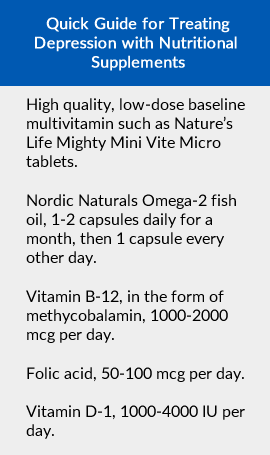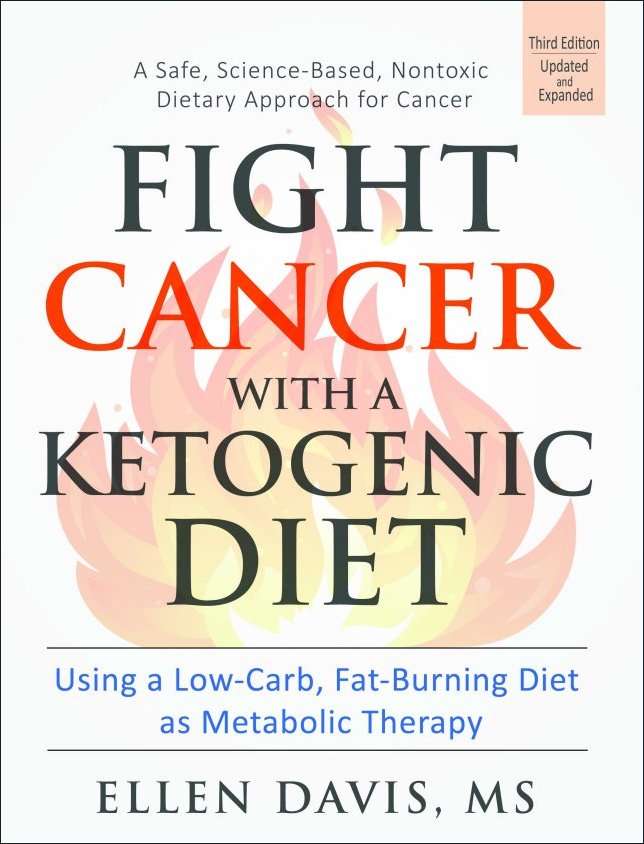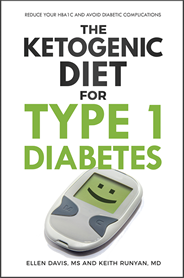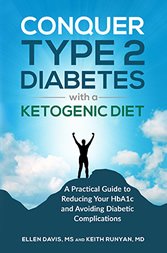Depression Treatment

Although the causes of depression can vary, depression treatment programs which involve changing the diet, addressing micro-nutrient deficiencies and healing a leaky gut can be very effective.
More specifically, by removing grains and high carb foods from your diet, and making sure you get the right vitamins and minerals, you can heal your gut, heal your body, resolve behavioral issues, and lift your mood. The list of supplement recommendations at right is a good place to start.
I want to reiterate that depression is linked to many different triggers, and a change in diet is by no means a comprehensive solution, but it is true that depression can be rooted in biochemical issues such as micro-nutrient deficiencies and fatty acid imbalances.
Environmental factors and of course, tragic events over which a person has no control (death of a family member, for instance) are also major causes of depression, and in these cases, dietary changes used as a depression treatment may have a lesser effect.
Gut Health and Depression
Current research is linking depression to inflammation linked to a leaking gut. Leaky gut syndrome, a condition in which the lining of the intestines has been compromised by a food substance such as gluten. The damaged lining of the intestinal tract then leaks undigested food particles into the rest of the body, causing inflammatory responses from the immune system. This inflammation then leads to neurological changes which result in mood alterations.
A paper by Kiecolt-Glaser et al. discusses how this inflammation in the body drives the symptoms of disease and depression. The authors state "Depression and inflammation fuel one another...Depression, childhood adversity, stressors, and diet can all influence the gut microbiome and promote intestinal permeability, another pathway to enhanced inflammatory responses."
Does Following a Low Carb Diet Cause Depression?
There are many articles on the internet which talk about the depressive effects of a low carb diet, but the authors of these articles have no real experience in using a low carb diet, and in my opinion, are misinformed.
The general thrust of these articles is that low carb = low serotonin in the brain = depression.
But here are some facts that contradict this:
First, the "low serotonin=depression" theory is not supported by the recent literature.
A recent study showed that INCREASED serotonin, not low serotonin, is associated with major depression.
And this article discusses the brain changes associated with depression, and the links between depression and heart attacks caused by platelet clotting. It seems to me that all of the factors discussed in this article are related not because one causes the other, but because all could be tied together as manifestations of body system damage by wheat gluten proteins. It's verifed that people who suffer from celiac disease (and others with wheat sensitivities) have a higher incidence of depression, heart disease, and blood clotting issues.
Secondly, it takes several weeks or longer for most people to adapt to a low carb diet. During that transition time when you are first reducing your carb intake, your body has to make new enzymes to burn fat instead of glucose. While it's busy making these enzymes, and you are eating less carbs, your brain chemistry is changing, and you may feel depressed.
But as your body adapts and learns how to burn fat instead of sugar, mood levels out, and the depressive feelings lift. You can assist this process by taking supplements to get you over the hump. L-glutamine, omega 3 fats, and tryptophan all help with the adjustment from burning sugar. This post explains this in more detail.
I can tell you from hard experience that for me, a high carb diet results in severe depressive episodes that come in cycles, and worsen with the amount of carbohydrate I eat. When I stick to a low carb diet, my mood evens out, I feel a lot better, and I'm not dependent on the next sugar fix to feel good. For me, low carb eating is a great depression treatment.
I know there are some people who just don't feel well when they cut back on carbohydrates, so this program is not for everyone. But if you stick to it and don't cheat, it can work wonders as a depression treatment.
More Information
All of my books are available in electronic PDF, and now in paperback on Amazon!
 |
 |
 |
|
Buy paperbook on Buy paperback on Amazon Buy the e-Book via Paypal |
Buy paperback on Buy paperback on Amazon Buy the e-Book via Paypal |
Buy paperback on Buy paperback on Amazon Buy the e-Book via PayPal |